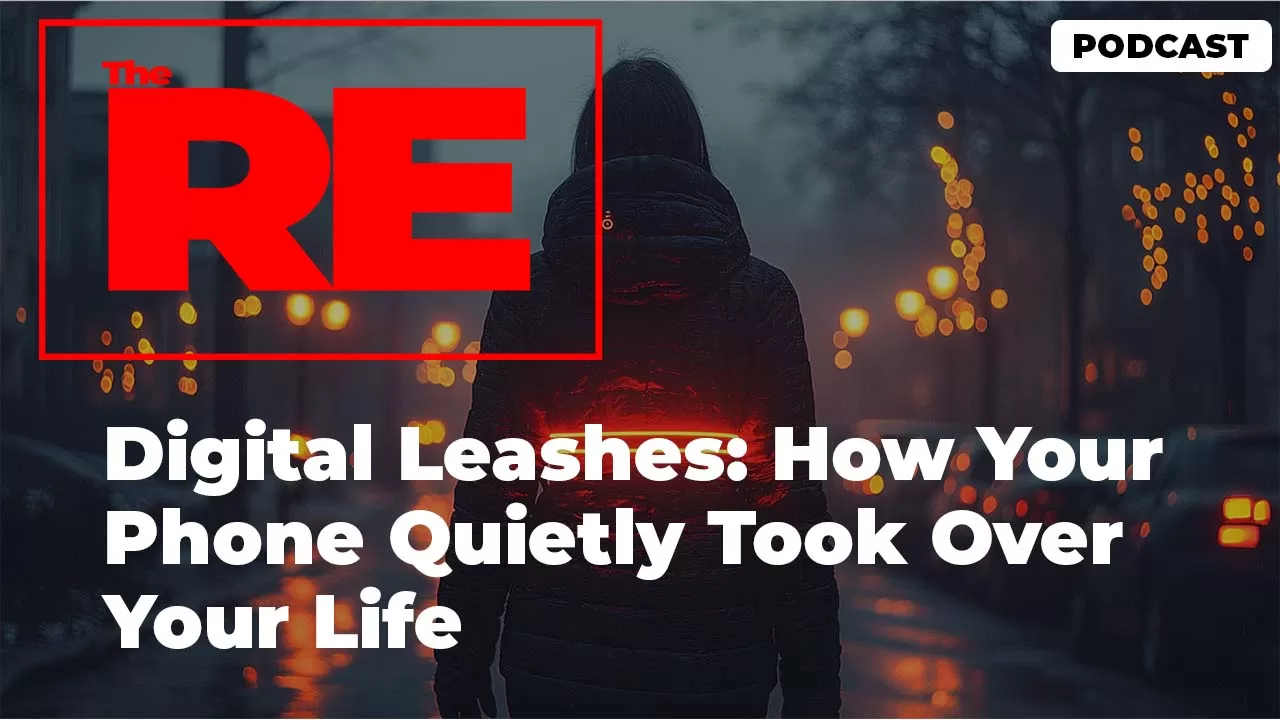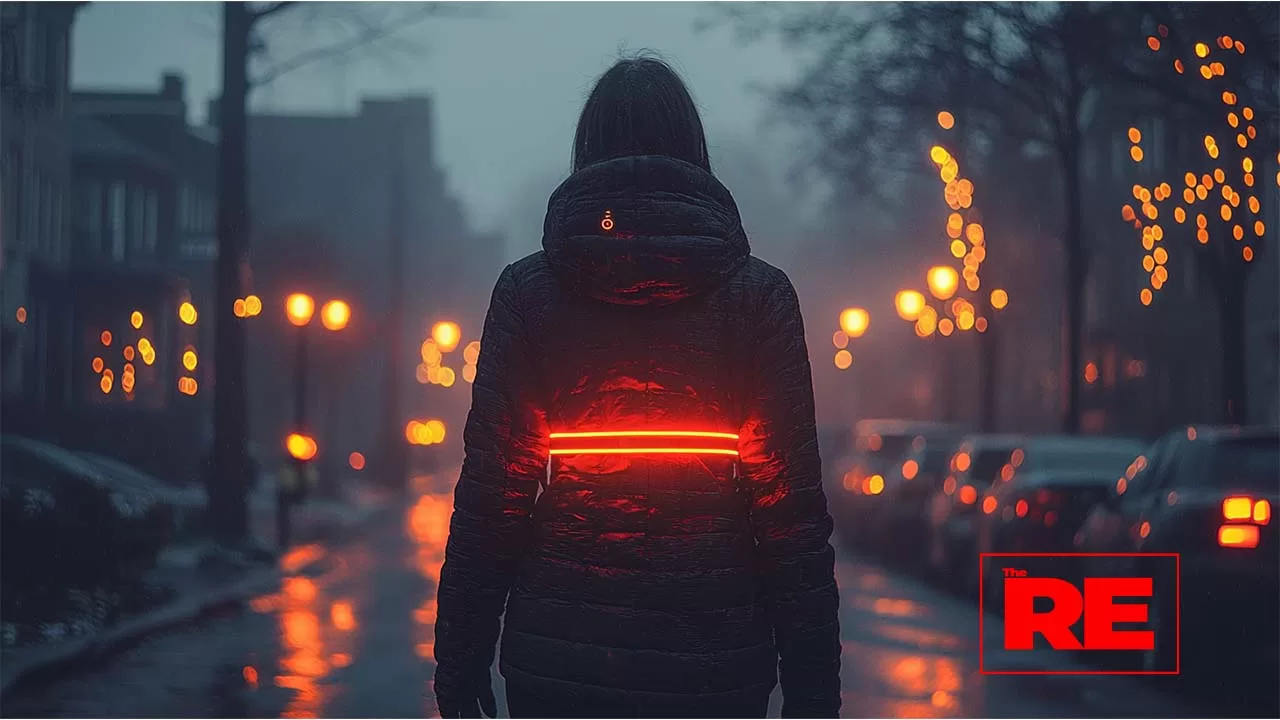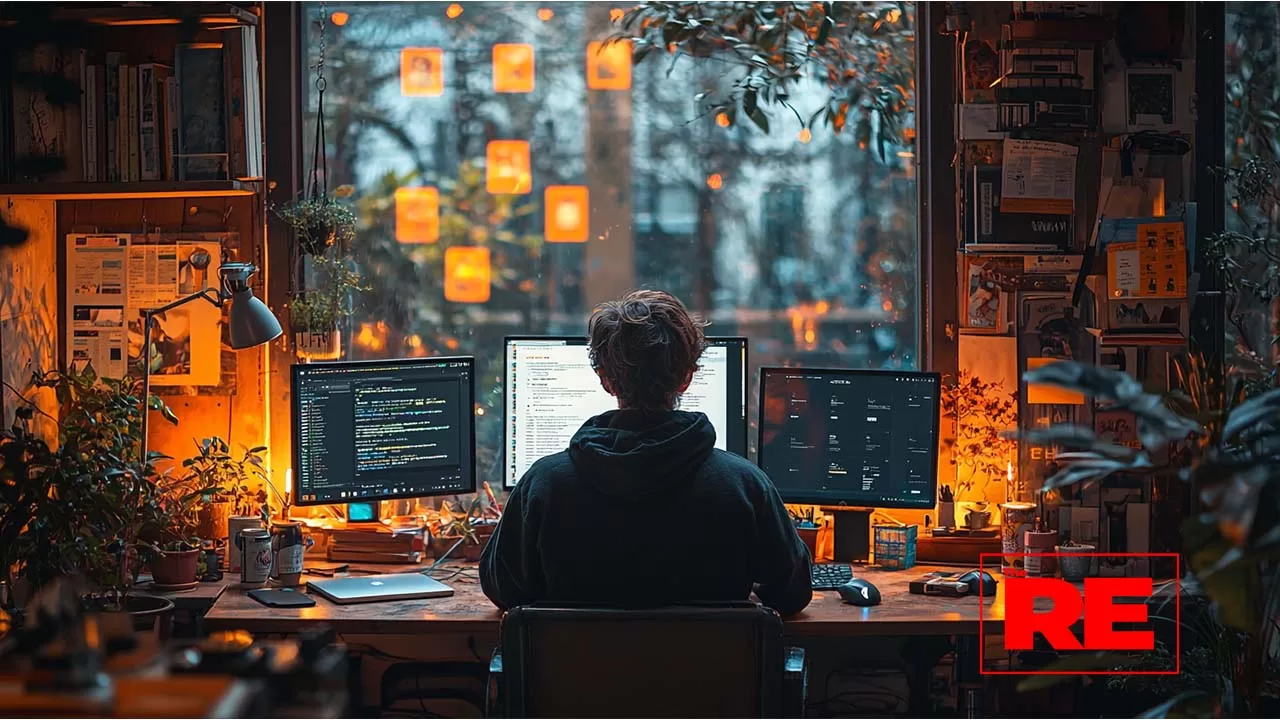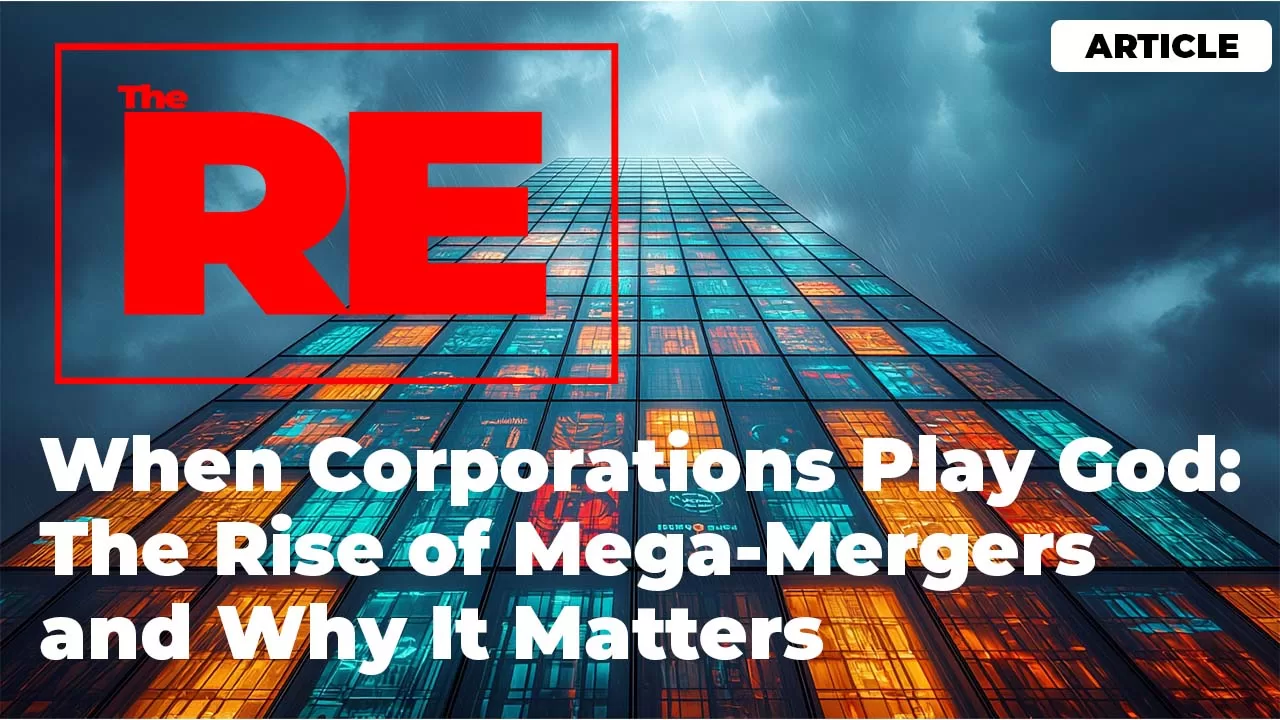The Ripple Effect
-News and Commentary-
Digital Leashes: How Your Phone Became the Boss of You
- Home
- News and Commentary
- Digital Leashes: How Your Phone Became the Boss of You


There was a time when people talked about technology like it was liberation. “The future is wireless,” they said. “Information at your fingertips.” “You can work from anywhere.” “Do anything from your phone.” And that part was true—sort of. You can do anything from your phone. But now? You can’t stop. You can’t unplug. You can’t disappear. Your freedom came wrapped in a notification bell, an unread badge, and a Terms of Service agreement you didn’t read but already agreed to.
What we thought was power has become a leash. And the craziest part? You clipped it on yourself.
Nobody forced us into this. We walked into it. Willingly. Excited even. The smartphone became a passport to a new world. But that world runs on attention, and attention has a price. So every app, every ping, every buzz—it’s not helping you. It’s tracking you, draining you, and shaping how you think without you even realizing it.
We live in an always-on economy. But nobody really asked if “always-on” is good. Because when you’re always on, you’re never off. Never resting. Never disconnected. Never yours. You take calls on your lunch break. You answer emails before brushing your teeth. You wake up in the middle of the night, not to pee—but because your brain heard a phantom notification that never came.
You don’t check your phone anymore. Your phone checks you.
And let’s be real—this isn’t about productivity. It’s about profit. You’re not the customer. You’re the product. Your attention is sold, resold, and repackaged in tiny slices to advertisers who don’t care how tired you are, how anxious you feel, or how badly you need a break. They care that you’re scrolling. They care that you clicked. They care that you paused for 2.8 seconds on a thumbnail of someone else’s curated life.
This isn’t just social media. It’s your entire digital experience. From Google Maps tracking your every movement to “smart” devices listening for your next cue—your phone knows more about you than your family does. It knows where you sleep, when you’re most vulnerable, what ads make you hesitate, and how long you stay on a screen before breaking focus. You think you’re the one in control, but look at the numbers—screen time, app usage, time spent online—and tell me who’s really running the show.
And don’t give me that “I can quit anytime” nonsense. We’ve all said that. But put your phone down for a day—just one—and watch what happens. The restlessness. The FOMO. The twitch in your hand like you left something behind. That’s not freedom. That’s addiction.
We talk about social media burnout, content fatigue, and “doomscrolling” like it’s just bad habits. But these are engineered behaviors. The platforms you use every day were built to exploit your psychology. Every like, every swipe, every share—it’s feeding something. Not just the algorithm. Your brain. Your identity. Your self-worth.
Because now, we don’t just use our phones. We live through them.
They tell us what to care about. Who to follow. What’s trending. They flatten time, blur truth, and trap us in feedback loops of anxiety and comparison. You’re working harder, scrolling longer, and somehow still feeling behind. Like you’re not doing enough. Not posting enough. Not being enough.
And when you do unplug—when you finally step back—it hits you how quiet the real world is. How slow. How human. But that moment is rare. Because just when you catch your breath, here comes another ping, another message, another reminder that you’re “missing out.”
It’s not a glitch. It’s the system working exactly as designed.
We’ve replaced boredom with alerts, silence with noise, real presence with filtered projection. And now the line between tool and tether is gone. We’re not free. We’re accessible. And that’s not the same thing.
So, what’s really going on here? Who benefits from our dependence? What does it cost us in the long run? And is there a way to take the leash off without losing connection altogether?
That’s what this piece is about.


Let’s pull the curtain all the way back.
You didn’t just stumble into phone addiction. You were pushed—strategically, aggressively, and with more money behind it than you’d believe. The phone in your hand, the apps you use, the way they nudge you, track you, buzz at you—it’s all intentional. Behavioral science meets capitalism. A multibillion-dollar industry built to keep you staring, clicking, buying, and burning out.
This didn’t happen overnight. It started in the boardrooms of Silicon Valley and Stanford’s Persuasive Technology Lab—the same place where former Google design ethicist Tristan Harris studied how to hijack human behavior. He’s since blown the whistle, but the blueprints are still in play. They call it “brain hacking.” Dopamine manipulation. Micro-addiction design.
Tech platforms don’t want your time. They want your attention—because attention leads to data, and data is money. Period.
Let’s talk about that data for a minute. Every time you swipe, pause, hover, or scroll, your phone logs that behavior. What you watched. How long you looked. Where you were when you looked. Whether you clicked. Whether you came back. It builds a psychological profile more detailed than anything your doctor or therapist could piece together. And it sells that profile—over and over.
Meta (Facebook), Google, TikTok, Amazon, X (Twitter)… these companies don’t make money from their platforms. They make money off you. You’re the product. Your behaviors, your patterns, your insecurities, your habits—they’re all turned into assets that advertisers, data brokers, and political operatives pay to access.
Ever wonder why you get certain ads right after a conversation? Why your feed suddenly shifts based on your mood or location? That’s not magic. That’s surveillance.
And it’s not just your screen time—it’s your real time. Google Maps knows where you sleep. Apple knows your walking patterns. Your banking app knows when your paycheck hits. Spotify knows your emotional rhythms. Uber knows where you go when you don’t want to be found.
Every single app is a node in a surveillance economy—and most of them aren’t even hiding it anymore. They’re just tucking the truth inside 50-page user agreements nobody reads.
The addiction part? That’s just to keep you feeding the system.
Now let’s talk tactics.
The infinite scroll wasn’t invented for convenience. It was designed to remove friction. If there’s no stopping point, you don’t stop. You just keep going. Twitter/X, TikTok, Instagram, Facebook—every major platform relies on it. You never know what’s next, so your brain gets a variable reward loop, the same psychological trick slot machines use.
Push notifications? That’s a whole strategy, too. There’s a reason why they show up when they do. They’re timed based on your behavior patterns, down to the hour. If the app knows you usually scroll at 8PM, that’s when it pings you. It’s not trying to be helpful. It’s trying to hook you before you open something else.
Badges and numbers on apps? Pure behavioral psychology. Your brain can’t ignore the little red dot. It triggers a sense of urgency—even if it’s nothing. That’s why platforms like LinkedIn or Facebook send fake “activity summaries” just to get you to log in.
Even the colors are chosen on purpose. Red notifications create anxiety. Blue buttons feel safe. Warm gradients feel friendly. It’s not design. It’s behavioral architecture.
Now combine that with the social pressure baked into everything. Read receipts. “Seen” notifications. Active status bubbles. The message isn’t just “use the app”—it’s “don’t leave anyone hanging.” Don’t disconnect. Don’t ignore that ping. Don’t be rude.
You’re not just addicted. You’re obligated. You’re being held emotionally hostage by a system that pretends to serve you while extracting your most valuable resource: time.
And here’s where it gets even darker: these platforms don’t care if you’re miserable—as long as you’re engaged.
Studies have shown that posts that trigger anger, outrage, fear, or insecurity outperform everything else. Facebook’s own leaked documents confirmed this. They knew their algorithms were prioritizing polarizing content. They knew it was harming mental health, especially in teens. But engagement metrics won. Because engagement equals ad dollars.
The result? A digital ecosystem that’s not just manipulative—it’s predatory.
And we’ve normalized it. We’ve started saying things like “That’s just how the internet is.” We blame ourselves for not having discipline. For being distracted. For getting stuck in loops. We make jokes about screen time, digital burnout, constant connectivity—as if it’s our fault.
But the truth is, you were never meant to win this game.
You’re up against billion-dollar machine learning models that know your patterns better than you do. You’re competing with tech companies that beta test emotional triggers. You’re expected to stay productive in a system designed to keep you scrolling, comparing, and consuming until you’re too exhausted to fight back.
And while you’re caught in that loop, somebody’s making money—lots of it.
Apple made $383 billion in 2023. Meta pulled in over $134 billion. TikTok’s parent company, ByteDance, hit nearly $120 billion in revenue—all fueled by data, ads, and behavioral exploitation.
Meanwhile, users are more anxious, more depressed, more burnt out, and more isolated than ever.
Work bleeds into rest. Rest feels like laziness. Productivity becomes identity. And all of it is filtered through a glass rectangle that we sleep next to, wake up with, and rarely question.
So ask yourself—who’s really the boss?
Because right now, your phone runs your schedule, your social life, your emotions, your memory, your sleep, your bank account, your to-do list, and your entertainment. And it does all of that while spying on you and selling your behavior to the highest bidder.
If that were a person, you’d call it abusive.
If that were a job, you’d quit.
If that were a relationship, your friends would tell you to run.
But because it’s a phone—something sleek and shiny and “essential”—you just call it normal.
This isn’t normal.
This is a leash.
And it’s time we start asking what freedom really looks like when disconnection feels like rebellion.


Let’s not sugarcoat it. By the time you get to this part of the piece, your phone has probably already buzzed. Maybe it was a calendar reminder. Maybe a text. Maybe some notification you did not ask for, like a suggestion to buy something you looked at yesterday or a random friend request that feels algorithmically forced. The point is, even while reading about your leash, you are still wearing it. And that is the real mind trip.
This is not about hating technology. Let’s be clear. I am not a Luddite. I use my phone like everybody else. I depend on it. Honestly, I am probably writing this draft on a screen right now. That is not the issue.
The issue is this: when a tool starts using you instead of the other way around, something is broken.
Phones were supposed to help us get more done. But now they are the reason nothing feels done. You check something off your to-do list and five more things pop up. You respond to an email only to get three more before the hour ends. You finally sit down to rest, and your brain cannot even relax because it is wired to expect another ping. Rest is no longer rest. It is just lag time between alerts.
And here is where it gets personal.
Because once you realize your phone is not neutral—once you really sit with the idea that your behavior has been modified, your habits engineered, and your attention bought and sold like a product—you have to ask a much harder question.
What would you be doing with your time if your phone was not telling you what to do with it?
That question hurts. Not because you do not have answers, but because you do. You would write. You would go outside more. You would call your mom. You would sleep better. You would focus. You would feel more present. You would stop comparing your life to strangers. You would be in your life again instead of just managing it.
That is the biggest cost of this system—not just your time, but your capacity.
Your phone does not just take your focus. It steals your potential. It eats the hours you would have spent on something deeper, something more rooted, something real. And in return, it gives you curated chaos. Drama. Ads. Noise. Endless content that feels urgent but leaves you empty.
And maybe you think you are the exception. Maybe you believe you have got this handled. But even if you turn off notifications, even if you set screen time limits, even if you unfollow or delete or detox, you are still playing in a system that was not built for your well-being.
It was built for engagement. And your health, your peace of mind, your creativity—those are collateral damage.
So what does freedom look like now?
I do not think it means going off-grid. Most of us cannot. Life runs through phones now—banking, work, maps, everything. But maybe it means being intentional as hell.
Not just saying “I am going to use my phone less,” but asking: Why do I keep reaching for it? What emotion am I avoiding? What is not getting done in my life while I scroll through someone else’s?
Maybe it means muting everything by default and only allowing what earns its place. Maybe it means deleting the apps that pretend to connect us but actually just perform us into exhaustion. Maybe it means reclaiming boredom—those still moments we used to fill with thought, with presence, with being.
And maybe it means starting conversations like this—not just calling out the system, but building something different.
Because right now, we are raising kids who have never known a world without algorithmic anxiety. We are building careers in digital hamster wheels. We are judging our worth by likes, retweets, and “seen” messages. And we are doing it all while pretending it is just the modern world.
It does not have to be.
It can be deeper. Slower. Quieter. More human. But only if we start choosing that. Only if we decide that being available twenty-four seven is not something to be proud of—it is something to recover from.
So no, you are not broken for feeling burnt out. You are not weak for needing space. You are not behind because you did not post enough this week.
You are human. And maybe the most radical thing you can do in a world built to track, ping, and monetize your every second is to take some of them back.
So if you are still with me, still reading, still breathing in between dings, put the leash down. Even just for today.





 and then
and then